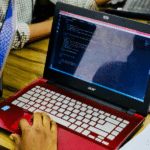Sponsored Post
We asked Dmitry Yurchenko, co-founder of AXL.tech, an IT platform for online schools, to tell us how blockchain is changing the world of online education. AXL.tech has made Dmitry a well-known expert in the field of online education as well as a conference speaker and bestselling author. In 2019, AXL.tech earned $26 million with one autowebinar only, and in 2021, the company launched an all-in-one SaaS platform that allows users to create online courses in any market and any language thanks to the built-in AI technology.
Interviewer: What is web3?
Dmitry: The Internet’s market of online services has evolved since the 2000s from Web1, when everything was sold as-is: there was no targeted advertising, no parsing in social networks, and no “catching up” advertising on Google or Amazon. The only interaction that took place was between a content creator and a consumer who exchanged money for goods or services.
Web2 appeared with the development of social networks in the late 2010s. At the same time, targeted advertising, in which the advertiser pays to reach a niche and specific audience, gained popularity. There is a big drawback to the model: the internet user themselves becomes a product that the advertiser buys and uses. Other downsides exist as well – on a platform owned and operated by others, you do not have total freedom over your content.
The biggest monopoly in the world right now is social networks. Even banks engage in competition, but Meta does as it wishes. Such systems may prevent entrepreneurs from doing business. Although we have helped create this network as users, we are treated as a product.
Web3 occurs in a situation when whoever makes the greatest contribution becomes a co-owner. The more content they create, the more tokens are shipped to them. This is the redistribution of the industry, in which the monopoly of soulless, for-profit companies will disperse, and those who treat the customer as a product will not last. Those who treat users as co-owners, however, will prosper.
How will this process affect online education? How can you mine coins during training?
Allow me to explain tokonomics as simply as possible. Online education will undergo tectonic changes due to blockchain, as all experts will be tokenized. A talented boy from Colombia or Brazil or a budding world-class footballer who needs money to train at the “assembly stage” can tokenize himself from the beginning. Subsequently, they can earn money from publicity. For this they need a whole media team, including a videographer and a story maker.
If a person grows publicly, then their tokens also grow along with the audience’s attention and the value of the brand. Crowdfunding “for development” can be achieved through the person issuing tokens to their fans. The investor in young talent will then own these tokens.
Is it possible to tokenize not an expert, but their product? An online course, for instance?
Yes, of course. For example, to sponsor the release of an online course, investors can become co-investors – in other words, customers of the course. 10-25% of their income is then transferred to token holders. Thus, each person can issue their personal shares if they show good growth and transparency and they fulfill obligations. Their tokens can grow indefinitely – this applies to artists, athletes, and even politicians.
Tokens of people who demonstrate that they can be trusted will be worth their weight in gold. They can then be exchanged for branded merch, discounts, or premium packages in courses or services of the tokenization object. Tokens will be exchanged between different online schools – like an exchange of coins between different institutions. Then the blockchain will evolve into industries such as insurance, mortgages, and investments in talented people.
A token that gives a discount also has value. Everyone wants to have access to premium products or proprietary items relating to the person they follow. Thus, it is possible to tokenize courses, experts, and even their posts. Such tokenized items will become digital property, or ownership of digital assets associated with the brand of a person – an athlete, a scientist, or even a politician.
Finally, the official sponsorship of a politician will cease to be a matter of ethics through the purchase of their tokens. If they, for example, become president, their tokens will cost more. In the future, it will be officially possible to deduct 10% of your income to the owners of these tokens. For example, a given professional may say: “I am a scientist and I promise to give 10% of my income to the DAO of ownership of my tokens.” The holders of those tokens are their investors-depositors.
The key drawback – aka the weakness of bitcoin – is that its mining requires the power of electricity and the computing power of the processor. Is there an advantage in mining learn tokens in the form of knowledge?
Yes. After all, their production requires only human energy and the power of the human brain.
Modern SaaS solutions for online education make it possible to tokenize even the learning process. For example, the AXL IT platform for online schools – thanks to the patented StudyTech technology – has a built-in scoring function for each student at the entry stage. You can track how they pass free materials, and even how thoughtfully and diligently they study. Indeed, each student gets a diary of sorts: their social graph.
It can also be used in a person’s credit or educational rating. A student will receive an educational ID – a summary report card of their scores and diligence as a student. Such a person’s balance, collected from all online schools and courses, will show how much knowledge they have accumulated, or how successful they are as a knowledge miner.
Until recently, the most advanced projects in online education and edutainment revealed the play-to-earn trend, but the trend has shown signs of instability. In such education experiments, users enjoy the gamification of learning by earning rewards including video game-like items for educational achievements.
In the field of education, there will be a learn & earn process. AXL.tech, as a market pioneer, is developing the knowledge mining protocol, in which the most important practice is to verify that the knowledge was obtained by a person, not a bot. This is the so-called Student DNA technology, which will verify proof of learning. The technology will check that a person is alive and performing tasks themselves and has not programmed a bot to mine coins by pressing buttons.
What will happen after these developments become mainstream?
It’s too early to make precise predictions about the development of web3 and blockchain. More precisely, they all remain at the level of futurological theorization, while there is a “bear market” in cryptocurrency and a number of high-profile scandals in the crypto world. Like any youth, the industry is storming with potential big questions, and this is felt by all players involved.
The play-to-earn and walk-to-earn projects fell as fast as they took off. They were classic Ponzi schemes. But fundamentally, they touched on a huge trend by motivating users through rewards. The play-to-earn bubble burst in the face of Axie Infinity, as did the move-to-earn led by Stepn. After all, the future belongs to projects and games, where people involved are motivated not only to earn, but to grow through learning.
The drive to earn tokens will be present in most industries. In games that people play solely for entertainment value, there will also be an option for additional motivation and play-and-earn incentives. In fitness applications that assist people with health and strength, there will be additional move-and-earn options. The same goes for meditations – calm-and-earn. For education – learn-and-earn.
When the thirst for knowledge is in the foreground, learners will be driven to participate in learn-and-earn incentives because they can earn coins which can be used to buy new courses. In popular games that are already being played, play-and-earn will be introduced as an additional incentive to continue playing.
That is why the model “learn and grow” looks the most promising. It is an ideal that was hinted at in many of the memorable games our generation enjoyed, in which we dreamed that money could be earned with your own mind. It’s not too late to talk about, and we should indeed be talking about it – regardless of whether it’s crypto winter or summer.
Sponsored Post



















